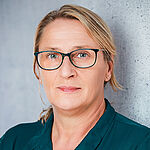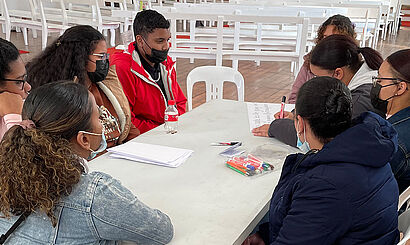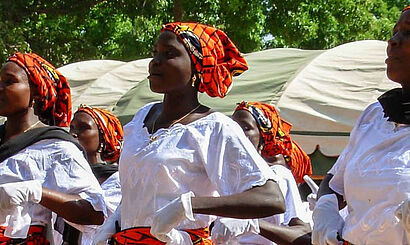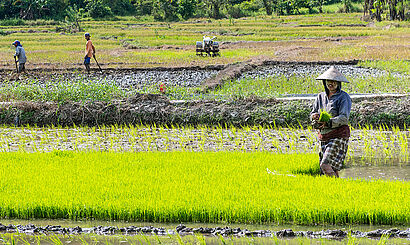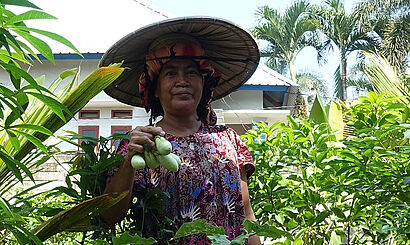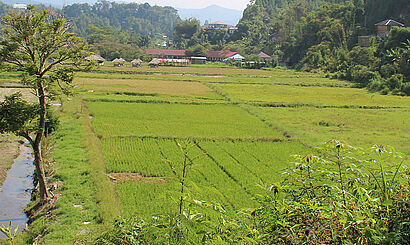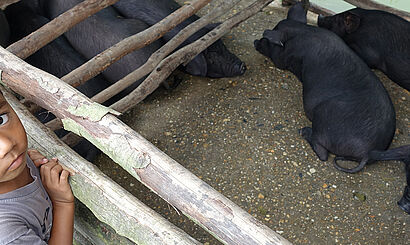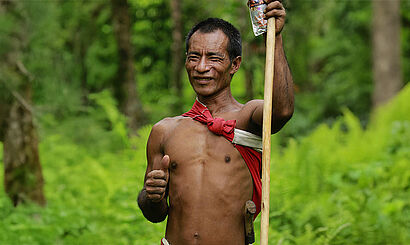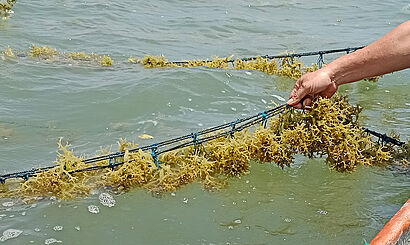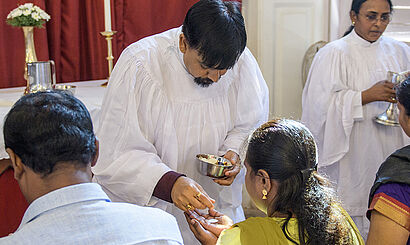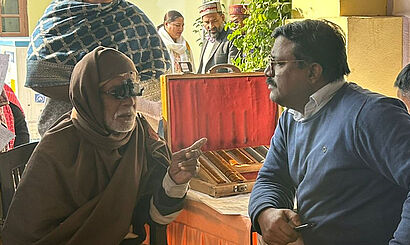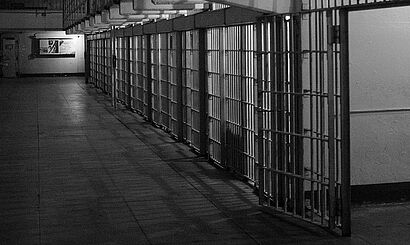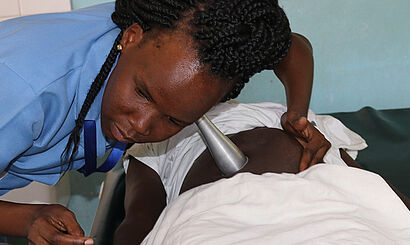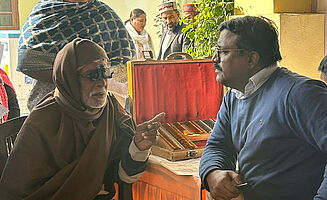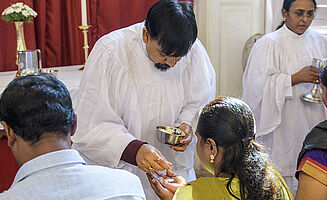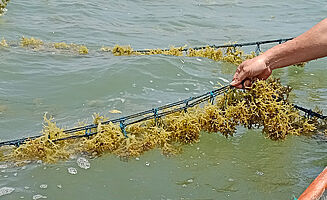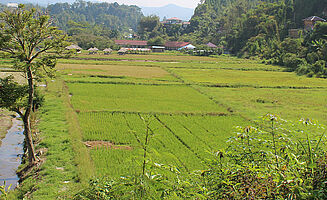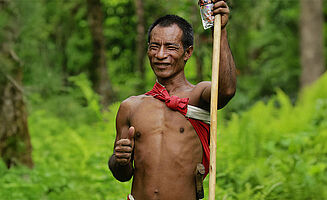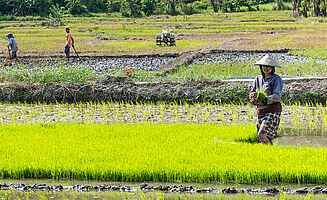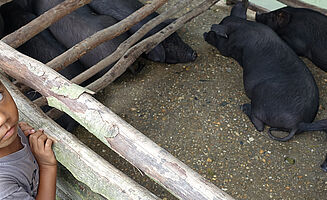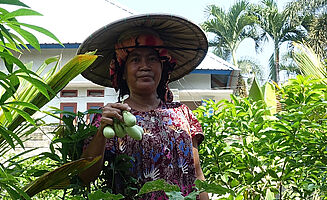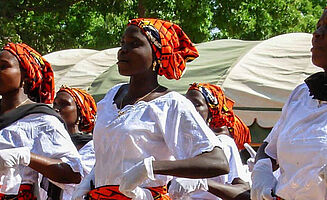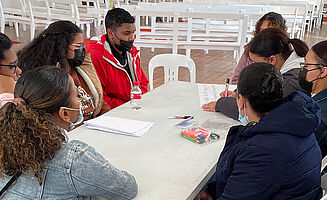A world without hunger and poverty, without war and violence, in which all people can lead a self-determined and dignified life. This is the goal, towards which we are working. We are committed to human rights and show solidarity with the ostracised, the marginalised and the vulnerable. We are dedicated to achieving just and humane living conditions. We encourage respectful conduct towards each other – across cultures and religions, regardless of gender, ethnical, religious and cultural affinity, and sexual orientation.

Projects in Lebanon
Lebanon: Johann Ludwig Schneller School
Hope exists in Lebanon: At the Johann Ludwig Schneller School, children and young people are given the chance of a better life. They can go to…
Projects in South Africa
South Africa: Future Prospects for Young Unemployed Adults
South Africa is regarded as a pioneer on the African continent. However, the country is struggling with extremely high unemployment rates. Youth…
South Africa: Masangane AIDS Programme
AIDS destroys the livelihood of many South Africans and their families since those infected can find no jobs and children are left as orphans. The…
South Africa: Elim Home for Children With Disabilities
"Every step forwards and each smile makes all our efforts more than worthwhile," says Lesinda Cunningham, head of Elim Home. Since 1963, Elim Home…
Projects in Nigeria
Nigeria: Hope Through Education
Nigeria has the largest population in Africa with about 230 million inhabitants. The country is facing major challenges: unemployment and…
Nigeria: Food and Livelihood Security
The supply situation in the northeast of Nigeria is a precarious one. In addition to the poor economic situation and environmental issues, the…
Projects in Cameroon
Cameroon: Medical Care and HIV Prevention
HIV educational work, support for those affected and their relatives, and modern medical technology: the health services provided by the…
Cameroon: Humanitarian aid and trauma relief
Cameroon is located on the border between the anglophone part of West Africa and francophone Central Africa. A bloody conflict rages in the…
Projects in Ghana
Ghana: Peacemakers
To help reduce violence in Ghana, young adults, teachers and pastors receive non-violent conflict resolution training. The so-called “Peacemakers”…
Ghana: Women Rearing Small Animals
Women in Ghana were given equal rights by law in 1992. However, they are still at a disadvantage compared with men when it comes to education and…
Ghana: Securing the Livelihood of Mothers With Disabled Children
Caring for a sick child means more than just investing a lot of time. It also involves treatment costs which often bring families to the limits of…
Ghana: Health Care
Many people in Ghana cannot afford a doctor. The Presbyterian Church offers a “Poor and Sick Fund” to help these people receive medical treatment…
Ghana: Interfaith Dialogue
The various religions in Ghana mostly live peacefully side by side. To ensure that everything stays this way, private and governmental…
Projects in Indonesia
Indonesia: Organic Farming – Tradition Takes New Directions
In Kulawi, a region in Central Sulawesi, the population is severely affected by the consequences of climate change. The Protestant Indonesian…
Indonesia: Education Opportunities for Children from Rural Communities
In Indonesia's remote rural regions, children have fewer education opportunities than in cities. Village schools often lack teachers or the right…
Indonesia: Reforestation in Sulawesi
In Indonesia, heavy rains and flooding have become more and more frequent due to climate change. The often indiscriminate clearing of forests has…
Indonesia: Innovation Centre for Ecological Businesses
There is an enormous need for ecological and social business concepts for small and medium-sized enterprises on the island of Bali. Together with…
Indonesia: Theological Education and Training
Christians are a minority in Indonesia. EMS currently supports four projects in its Indonesian member churches, which deal with the education and…
Indonesia: Combating Poverty through Sustainable Freshwater Fish Farming
The district of Mamasa is located inland in the Indonesian province of West Sulawesi. Although its landscape is hilly and rich in water, it is…
Indonesia: Sustainable Community Growth
Sulawesi is one of the poorer islands in Indonesia. Religious conflicts, a lack of food or the danger of AIDS are only some of the local problems.…
Indonesia: Musical Training for Young People
Many young people from different regions of the country live on the Indonesian island of Sulawesi. They often struggle with identity issues at…
Indonesia: Pig Farming Improves the Lives of Many Families
Many people in West Sulawesi live from traditional agriculture and raising livestock. Their income is low and many families suffer because of…
Indonesia: new training openings to empower young adults
Young adults living in rural communities on Sulawesi have hardly any training opportunities at all. The Toraja church supports young adults on…
Indonesia: Cultivating Fruit and Vegetables – a Way Out of Poverty
Many people in the rural regions of Sulawesi live in poverty. The Christian Church in South Sulawesi (GKSS) runs an agricultural project which…
Indonesia: Boarding Homes in Makassar
Since Indonesian village schools are poorly equipped, many parents send their children to secondary schools in the city. There the children find…
Indonesia: Empowering the Marginalised – Helping the Tugutil People to Help Themselves
The Tugutil tribe lives in the forests of Halmahera. Multinational corporations are mining there, destroying the natural environment and thus the…
Indonesia: Work With Children With Disabilities
“Your handicap is a punishment from God.” Children with disabilities in Indonesia still suffer from this stigma. A women's initiative of the…
Indonesia: Algae Against Poverty
Indonesia is a country with thousands of islands and countless coastal areas, but its economic potential through access to the sea is far from…
Projects in India
India: Children’s Homes in South India
With its children’s homes, the Church of South India is systematically advocating better living conditions for boys and girls who need help.
India: Learning Through Living With the Poor
In India, two thirds of the people live in poverty. Over 30 percent are considered as extremely poor. Pastors from the Church of South India stand…
India: Theological Education and Training
The Church of South India (CSI) is committed to serving the people of India's southernmost states in a variety of ways. Its mission is not only to…
India: Theological Training at the KTC
India is a country of enormous cultural and religious diversity but where the gap between rich and poor is gradually growing. Indian theology…
India: Healthcare for Villages in the State of Punjab
India is the world's fastest growing major economy. While part of India's population participates in the growing economic prosperity, another part…
Projects in Jordan
Jordan: Theodor Schneller School
Education for all – this is the guiding principle of the Theodor Schneller School in Jordan. Children and young people from poor and difficult…
Jordan: Integrated School for Blind and Visually Impaired Children
Many parents in Jordan are ashamed of their blind children and hide them away at home. An integrated school in Irbid gives these children…
Projects in Japan
Japan: Work With Discriminated Buraku
The Buraku is a Japanese minority which is constantly faced with social discrimination. Although they were granted equal rights by law in 1871,…
Japan: Prison Chaplaincy
When compared internationally, Japanese prisons have a very strict discipline. The United Church of Christ in Japan (KYODAN) visits people in…
Japan: Interreligious Studies in Japan Programme
A better understanding of one’s own faith; understanding other religions; or learning more about Asia and Christian theology – this is all…
Projects in South Korea
Korea: Diakonia Sisterhood
Poverty in old age is a major issue in Korea. It is only recently that pension insurance was introduced there, which is why elderly people often…
Projects in Malaysia
Malaysia: Protecting Women from Violence
Human trafficking, exploitative working conditions, abuse at the hands of partners: the violence, to which women in Malaysia and Indonesia are…
Projects in Südsudan
South Sudan: Peace Work and Trauma Recovery
South Sudan is the youngest country in the world. Its road to independence has been associated with unimaginable suffering. Even now, many people…
South Sudan: Midwifery School – Life for Mothers and Children
Child and maternal mortality rates are extremely high in South Sudan. Training young women as midwives saves lives. At the same time, it also…
South Sudan: Education for the Future – Schools and Children’s Home
Education is the key to a better life – particularly in a poor country like South Sudan. The Presbyterian Church of South Sudan (PCOSS) is…
Projects in Germany
Germany: EMS Emergency Aid
In catastrophes and crises, the ability to respond quickly becomes a matter of survival. Thanks to EMS emergency aid, we are effectively prepared…
Germany: General Work
With your donation towards “general work”, you are supporting the various tasks of the EMS, exactly where your help is needed most urgently.
- Fight Against Poverty + Justice
- Education + Peace Education
- Empowering Women
- Health + Environment
- Mission + Theology
- All
- Fight Against Poverty + Justice
- Education + Peace Education
- Empowering Women
- Health + Environment
- Mission + Theology
- All
Cameroon is located on the border between the anglophone part of West Africa and francophone Central Africa. A bloody conflict rages in the southwest of the country, caused by the political repression of the…
HIV educational work, support for those affected and their relatives, and modern medical technology: the health services provided by the Presbyterian Church in Cameroon (PCC) deliver primary healthcare for the rural…
In catastrophes and crises, the ability to respond quickly becomes a matter of survival. Thanks to EMS emergency aid, we are effectively prepared for such situations.
With your donation towards “general work”, you are supporting the various tasks of the EMS, exactly where your help is needed most urgently.
Many people in Ghana cannot afford a doctor. The Presbyterian Church offers a “Poor and Sick Fund” to help these people receive medical treatment free of charge.
The various religions in Ghana mostly live peacefully side by side. To ensure that everything stays this way, private and governmental institutions support the dialogue between the religions continuously. The…
To help reduce violence in Ghana, young adults, teachers and pastors receive non-violent conflict resolution training. The so-called “Peacemakers” are on a mission of peace!
Caring for a sick child means more than just investing a lot of time. It also involves treatment costs which often bring families to the limits of their endurance. How can we help them? The Presbyterian Church of…
Women in Ghana were given equal rights by law in 1992. However, they are still at a disadvantage compared with men when it comes to education and the labour market. An animal rearing project developed by the…
With its children’s homes, the Church of South India is systematically advocating better living conditions for boys and girls who need help.
India is the world's fastest growing major economy. While part of India's population participates in the growing economic prosperity, another part does not. India is a country of inequalities. One look at the…
In India, two thirds of the people live in poverty. Over 30 percent are considered as extremely poor. Pastors from the Church of South India stand by them and support them with their problems. But for them, it is…
The Church of South India (CSI) is committed to serving the people of India's southernmost states in a variety of ways. Its mission is not only to proclaim the faith, but also to actively serve society. It meets the…
India is a country of enormous cultural and religious diversity but where the gap between rich and poor is gradually growing. Indian theology students must be trained to face these challenges.
Indonesia is a country with thousands of islands and countless coastal areas, but its economic potential through access to the sea is far from exhausted. The Christian Church in South Sulawesi (GKSS) is launching a…
Since Indonesian village schools are poorly equipped, many parents send their children to secondary schools in the city. There the children find lodging and supportive care in Christian boarding homes.
The district of Mamasa is located inland in the Indonesian province of West Sulawesi. Although its landscape is hilly and rich in water, it is distant from the coast and major cities. Many families work in the rice…
Many people in the rural regions of Sulawesi live in poverty. The Christian Church in South Sulawesi (GKSS) runs an agricultural project which trains farming women and men in well-founded cultivation methods to…
In Indonesia's remote rural regions, children have fewer education opportunities than in cities. Village schools often lack teachers or the right equipment. The Protestant Church in South East Sulawesi is creating…
The Tugutil tribe lives in the forests of Halmahera. Multinational corporations are mining there, destroying the natural environment and thus the Tugutil's livelihood. The Evangelical Christian Church in Halmahera…
There is an enormous need for ecological and social business concepts for small and medium-sized enterprises on the island of Bali. Together with the Dhyana Pura University, the Bali Church is actively working on…
Many young people from different regions of the country live on the Indonesian island of Sulawesi. They often struggle with identity issues at their new place of residence. The church music laboratory run by the…
In Kulawi, a region in Central Sulawesi, the population is severely affected by the consequences of climate change. The Protestant Indonesian Church in Donggala (GPID) is therefore training farmers in sustainable…
Many people in West Sulawesi live from traditional agriculture and raising livestock. Their income is low and many families suffer because of this. The Christian Church of West Sulawesi (GKSB) is now striving to…
In Indonesia, heavy rains and flooding have become more and more frequent due to climate change. The often indiscriminate clearing of forests has now resulted in soil erosion and landslides, which in turn threatens…
Sulawesi is one of the poorer islands in Indonesia. Religious conflicts, a lack of food or the danger of AIDS are only some of the local problems. The churches are battling intensively to sustainably improve the…
Christians are a minority in Indonesia. EMS currently supports four projects in its Indonesian member churches, which deal with the education and training of volunteers and pastors.
“Your handicap is a punishment from God.” Children with disabilities in Indonesia still suffer from this stigma. A women's initiative of the Taraja Church breaks through the isolation of these children and stands up…
Young adults living in rural communities on Sulawesi have hardly any training opportunities at all. The Toraja church supports young adults on their career paths so that they can build a better future for…
A better understanding of one’s own faith; understanding other religions; or learning more about Asia and Christian theology – this is all possible with the Interreligious Studies in Japan Programme.
When compared internationally, Japanese prisons have a very strict discipline. The United Church of Christ in Japan (KYODAN) visits people in prison and provides them with pastoral care.
The Buraku is a Japanese minority which is constantly faced with social discrimination. Although they were granted equal rights by law in 1871, everyday life is a totally different story. The KYODAN Church stands up…
Many parents in Jordan are ashamed of their blind children and hide them away at home. An integrated school in Irbid gives these children prospects for the future – through elucidation and a decent education.
Education for all – this is the guiding principle of the Theodor Schneller School in Jordan. Children and young people from poor and difficult circumstances are offered a chance at a better life.
Poverty in old age is a major issue in Korea. It is only recently that pension insurance was introduced there, which is why elderly people often find themselves in financial difficulties. Poverty also quickly…
Hope exists in Lebanon: At the Johann Ludwig Schneller School, children and young people are given the chance of a better life. They can go to school, learn dialogue between cultures, and are prepared for the future…
Human trafficking, exploitative working conditions, abuse at the hands of partners: the violence, to which women in Malaysia and Indonesia are subjected, has many faces. Together with Swiss missionary group Mission…
The supply situation in the northeast of Nigeria is a precarious one. In addition to the poor economic situation and environmental issues, the terrorist threat posed by the jihadist militia Boko Haram has aggravated…
Nigeria has the largest population in Africa with about 230 million inhabitants. The country is facing major challenges: unemployment and inflation are very high and this affects women and young adults in…
"Every step forwards and each smile makes all our efforts more than worthwhile," says Lesinda Cunningham, head of Elim Home. Since 1963, Elim Home in South Africa has provided a place to live for children with…
South Africa is regarded as a pioneer on the African continent. However, the country is struggling with extremely high unemployment rates. Youth unemployment in South Africa is among the highest in the world. The…
AIDS destroys the livelihood of many South Africans and their families since those infected can find no jobs and children are left as orphans. The "Masangane" project brings back hope to AIDS sufferers and to the…
Education is the key to a better life – particularly in a poor country like South Sudan. The Presbyterian Church of South Sudan (PCOSS) is campaigning to allow as many children as possible to take their opportunity…
Child and maternal mortality rates are extremely high in South Sudan. Training young women as midwives saves lives. At the same time, it also provides genuine professional prospects.
South Sudan is the youngest country in the world. Its road to independence has been associated with unimaginable suffering. Even now, many people are still deeply traumatised by war and violence. Together with…
Our way, our mission.

Targeted
Your donation goes to help those who need help most.

Sustainable
Your commitment makes it possible to sustainably improve the situation.

Efficient
When many people join forces, it effectively reduces costs.
What we support
25 evangelical churches and five missionary societies in Asia, Africa, Europe and the Middle East, who work together and on equal footing to create a better world: Through its programmes and projects, the EMS Fellowship is committed to the fight against poverty, development cooperation, health work and social welfare work, and to the empowerment of women and minorities. We promote school and education programmes for children and young people, as well as training and further education programmes for evangelists. We also support civil conflict management and peace work, as well as emergency aid and reconstruction work in war zones and disaster areas.

Where we offer support
As a modern missionary society, the Evangelical Mission in Solidarity (EMS) works in more than ten countries on three continents. Our member churches and partners support each other on roughly 60 projects and numerous programmes. Incorporating local structures improves the quality of the reciprocal help. This cooperation connects the ecumenical fellowship, strengthens the solidarity of the churches, and promotes ecumenical and global learning through exchange within the projects. This way, we can guarantee direct contact with the parties concerned and ensure that our work is supervised effectively.
Donation Account
Evangelische Bank eG
IBAN: DE85 5206 0410 0000 0001 24
BIC: GENODEF1EK1
Germany: General Work
How we offer support
In a fair and democratic procedure, our members decide the objectives and distribution of resources. Personal contact and the exchange of knowledge between churches and societies, as well as between those responsible for projects and programmes, is an important objective of our work. Christian ethics and Christian values form the mandatory basis of our actions. Everyone – regardless of religion, descent or language – should benefit from the success of a project or programme. We report regularly on how our work is progressing.
By donating, you are helping us to support people in desperate need of help. Through our projects, people are given prospects in life, for example through a sound education or good healthcare. In the long-term, this produces structures that improve the lives of everyone in the supported region. Play a part. Give people the gift of hope.
The goal of the EMS is to help people in the long term. The EMS Foundation provides the financial basis required to make this possible. Every year, the revenues from the foundations’ assets help people in need. You too can help. Your support allows us to achieve something lasting. With a lifetime foundation or a bequest, you are effectively supporting the work of the EMS, as you are giving people long-term opportunities that they would not otherwise have.
The projects and initiatives of the EMS are effective, varied and exemplary when it comes to cooperative partnerships. But how much more could the EMS achieve if more people were aware of the good work it does? Mission work, aid and charity move and connect people. Being a part of this global network allows you to support people sustainably. That feels good, doesn’t it? Then spread the word or volunteer with the EMS.
We are pleased to hear that you are interested in the work of the EMS. If you have any general questions, please use the contact form below. We are also happy to help you personally if you have any questions or require further information – by phone or by E-mail.
